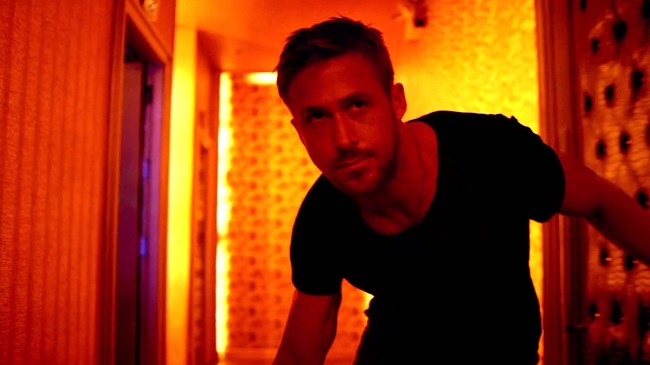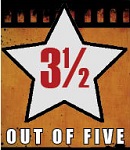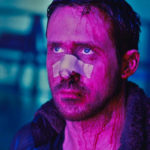

I can understand why Only God Forgives has received a chorus of mixed reactions since its premiere at Cannes, where the film was reportedly booed. (Though that's the same prestigious film festival where Pulp Fiction was booed when it won the Palme d'Or and Clerks 2 received a two-minute standing ovation. So take that as you will.) Still, it's a tough film to process because it doesn't go out of its way to overly explain itself nor the actions of its characters. There also aren't many likable characters in the movie, at least as far as measuring a person by their scruples goes.
The second collaboration between director Nicholas Winding Refn and Ryan Gosling following Drive, Only God Forgives is almost dreamlike in its minimalist approach. It's beautifully shot in shades of neon, tempered with utter darkness, which really helps to sell the seediness of the world it observes. The cinematography creates a beautiful candy shell for some truly rotten individuals and the horrible stuff they partake in.
In terms of story, the film is fairly straightforward. The characters who populate it, however, succeed in complicating the tale, one with roots that seem to be based in the gray areas of meting out justice, redemption, the need for acceptance and owning up to the errors of one's ways. Gosling plays Julian, one third of a crime family operating out of Thailand that consists of him, his sick fuck of a brother, Billy (Tom Burke), and their domineering mother, Crystal (Kristin Scott Thomas, playing completely against type). When Billy rapes and murders a young Thai girl for no reason, Crystal comes into town demanding revenge. Naturally, everything goes to hell as a result.
Gosling gives a performance reminiscent of Driver from Drive but with even less dialogue and more staring of the moody variety. Julian's inner thoughts are nebulous at best, but it's immediately apparent that he's at odds with himself as a person in general. Due largely to the emasculation tactics that his mother subjects him to, his inability to come to grips with his raging self doubt and unwillingness to seek vengeance for his murdered brother at his mother's behest keep him in a nearly catatonic state. There are heavy elements of Freudian and Oedipal themes at work in this film, and, as a result, the dynamic between Crystal and Julian is a car wreck that you can't look away from.
As good as Gosling is, the film ultimately belongs to both Scott Thomas and Vithaya Pansringarm, the latter of whom plays Chang, the resident dealer of swift justice whose code of honor makes him the closest thing to a "good guy" in the film. In fact, he's probably one of the scariest guys I've ever seen in a film, period. From the moment you see him, you're transfixed by the man and his dead eyes, which seem to see all.
Pansringarm's performance is assuredly one of the highlights of the film but in a manner completely opposite to what Scott Thomas brings to the table. I've heard her character described as "despicable," and there's simply no better word to describe the woman. From the moment she appears on screen, she comes on with nothing less than brute force. By the end of the film, she's managed to pull a Gary Oldman and deliver a performance that is scenery chewing of the best kind. Crystal is a woman content to barrel through life and make anyone and everyone feel like shit simply because she can. Her belittling of Julian during a dinner scene ranges from being awkward to downright cringe inducing. It's a showstopper of a performance, one that really goes to show that sometimes it can be an almost magical thing when you put an actor outside of their comfort zone. Even in what is technically a supporting role, Scott Thomas gets to show a wide range of emotions and utilizes her talents to the fullest, making her one of the more memorable and best things about Only God Forgives. It's a great, chill-inducing moment when Julian explains to Crystal what his brother did to get himself killed, to which she replies, "Well, he must have had his reasons."
The violence in the film has been the subject of much discussion and with good reason, as Refn's handling of the subject matter is incredibly visceral. Limbs fly, bones are exposed, blood spurts and punches connect with bone-crunching sounds that recall filmdom's worst beatings. The thrashing that Julian takes at the hands of Chang is one that many people will probably watch through their fingers.
The music by Cliff Martinez, who also scored Drive, deserves special mention as well. It's perfect for setting the dark mood of the film, using synth and orchestral elements to create a score that hearkens back to noir films of old and more contemporary works like Scorsese's Taxi Driver and David Lynch's Mulholland Drive. The Asian influence in the score is heavily apparent and goes hand in hand with the neon-streaked visuals of the films, where characters are bathed in shadow and the streets seem to hide plenty even when awash in bright, fluorescent blues, reds and green.
Refn's film seems designed to divide viewers and critics alike for its refusal to adhere to the rules of cinema. On one level, Only God Forgives is accessible art-house fair, thick with blood drenched violence and simmering with internal and external conflict among its characters. But it's accessible only to a point, demanding that you pay attention to pick up on themes that aren't spelled out. It's also too well made to skip just because reaction has been so split. Some just don't do well with stories that revolve around hateful people doing hateful things and suffering some pretty dire consequences as a result.











